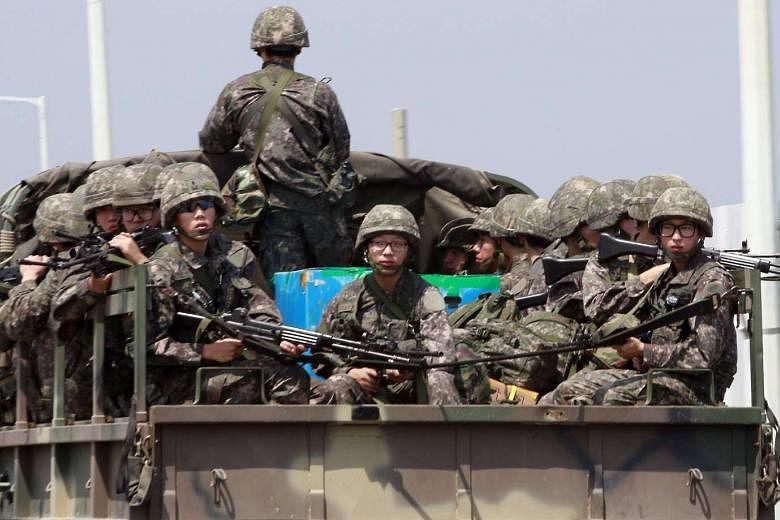SEOUL (Reuters) - South Korean President Park Geun Hye said on Monday it was important for North Korea to apologise at an inter-Korea meeting for armed "provocations", including planting landmines that wounded the South's soldiers this month.
"We need a clear apology and measures to prevent a recurrence of these provocations and tense situations," Ms Park told a meeting with her top aides, according to a statement released by her office.
"Otherwise, this government will take appropriate steps and continue loudspeaker broadcasts."
The broadcasts, which began after the landmine incident, prompted Pyongyang to fire artillery against the South last week, bringing the peninsula to the brink of armed conflict.
Top negotiators from North and South Korea talked through a second-consecutive night and into Monday morning in a marathon bid to defuse tensions that have brought the peninsula to the brink of armed conflict.
The talks at the Panmunjom truce village inside the Demilitarised Zone (DMZ) began on Saturday evening, shortly after North Korea's deadline passed for Seoul to halt anti-Pyongyang propaganda broadcasts or face military action.
They broke up before dawn on Sunday and restarted that afternoon, with the bitter rivals on high military alert after an exchange of artillery fire on Thursday.
The delegates were "continuing talks for long hours in the midst of the critical situation" on the peninsula, Mr Min Kyung Wook, a spokesman for South Korea's presidential Blue House, told reporters on Monday, without giving further details.
The United Nations, the United States and the North's lone major ally, China, have all called for calm.
Professor Yoo Ho Yeol of the North Korean studies department at Korea University in Seoul said the unusually long session was a good sign.
"They are not talking for the sake of a breakdown but for the sake of agreement. There must be a lot of fine-tuning and convincing between the two parties," Prof Yoo said.
Ms Park's national security adviser Kim Kwan Jin and Unification Minister Hong Yong Pyo are representing the South in the talks. Mr Hwang Pyong So, the top military aide to the North's leader Kim Jong Un, and Mr Kim Yang Gon, a veteran North Korean official in inter-Korean affairs, are representing Pyongyang.
Despite the talks, North Korea had deployed twice the usual artillery strength at the border and had more than 50 submarines away from base, the South's Defence Ministry said on Sunday.
South Korea, also on high alert, has said it had no plans to halt the propaganda broadcasts that triggered the latest stand-off.
The envoys, shown on TV exchanging handshakes and tight smiles at the start of their meeting on Saturday, discussed ways to resolve tension and improve ties, the Blue House said on Sunday.
Tensions rose early this month when two South Korean soldiers were wounded by landmines along the border. The North said it was not responsible for laying the mines.
Days later, Seoul began its propaganda broadcasts in random three-hour bursts from 11 banks of loudspeakers, including news reports and K-pop music from the South, resuming a tactic both sides halted in 2004.
The crisis escalated on Thursday when the North fired four shells into the South, according to Seoul, which responded with a barrage of 29 artillery rounds. North Korea declared a"quasi-state of war" in front-line areas and set an ultimatum for Seoul to halt its broadcasts.
That deadline passed on Saturday without any reported incident.
The United States, which has 28,500 soldiers based in South Korea, is conducting annual joint military exercises with the South. North Korea regularly condemns the manoeuvres as a preparation for war.
Ties have been virtually frozen since the 2010 sinking of a South Korean warship, which Seoul has blamed on a North Korean submarine. Pyongyang denies responsibility.

